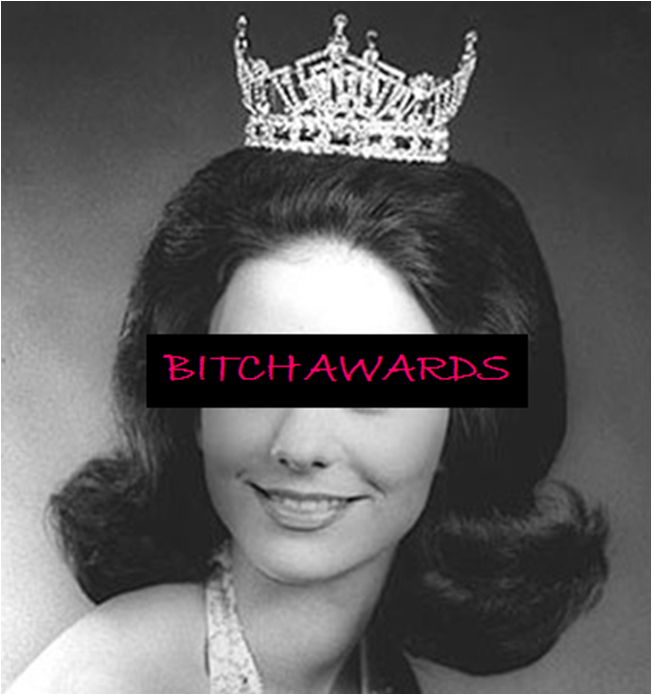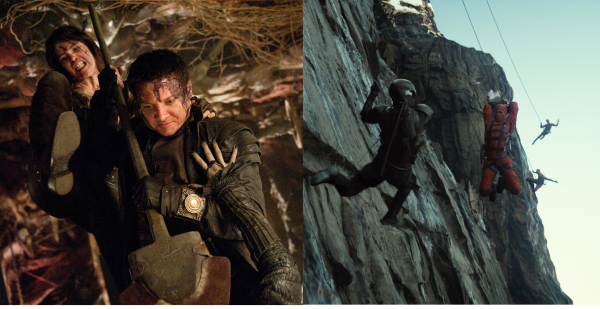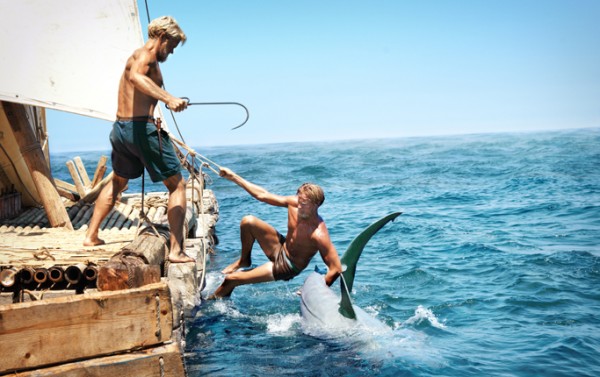
Welcome to the third annual Bitch Awards, celebrating the best and worst in film and TV for the year. Stick around for the next two weeks as we raise a glass to our favourite works from 2013 (and duck as we unceremoniously throw the remote at our least favourites).
Click through for our #5 pick for best and worst films…
Let’s begin by explaining the selection process:
- We readily admit that we have not seen all the films that were released in 2013. Our lists are comprised of films that we did see, and we’ll mention those that, for one reason or another, we were unable to see that might have otherwise made the cut. (You’ll see that list when we get to #1 on Friday!)
- Some of these films may have been in limited release in 2012, but we still count them as 2013 if they went into wide release this year.
- We do dissect the films, but if we’re going to blow the ending or a crucial scene, we will put up a SPOILER warning. Considered yourself warned.
- Bear in mind that our purpose here is not to be definitive; we simply want to encourage you to seek out some new films (and avoid others at all costs).
- Click the links to see the results the 2012 and 2011 Bitch Awards for film
Today we kick things off a week focusing on the peaks and the valleys of the film spectrum for 2013. Read on for our #5 picks.
WORST
TVAngie:
#5: The World’s End (Wright, 2013)
Many will likely say that I have no business putting this film on my list as it’s the only one I’ve seen from the ‘Three Flavours Cornetto’ trilogy. But it’s precisely because of that reason that The World’s End makes my list of worst films of the year. I feel like in order to enjoy this film you have to have done your homework by viewing the prior two films of the series – and that doesn’t make much sense at all. Good films should stand alone plain and simple. If they fit into a large oeuvre, so be it. But in this case, I felt completely alienated during The World’s End, like there was a big in-joke that would magically make this film hilarious that I just wasn’t in on.
The plot is quite simple. A misfit, Gary King (Simon Pegg) is hell-bent on reliving his high school glory days by completing an epic pub-crawl in his hometown with his former high school cronies. During said pub-crawl, he discovers that body-snatching aliens have actually overtaken the town. Normally such a preposterous plot would yield hysterical results, especially with a cast that includes Nick Frost, Eddie Marsan and Martin Freeman. But alas, The World’s End, despite some deeply committed actors, devolves into the stupid by taking itself entirely too seriously. I kept wondering when we’d get that moment when we discover the film’s sci-fi angle was all just a bad, booze induced dream. I suppose denying us that explanation is where the infamous Wright/Pegg genre subversion comes in play (*groan*).
I’ll admit the first act of the film has legs as Gary valiantly tries (and succeeds) to ‘get the gang back together’. And the performances themselves are quite good with some genuine laugh out loud moments. Heck I can’t even fault the execution. The problem here all comes down to plot. There’s definite potential in the first 20 minutes that could produce an intelligent dark comedy, but once the aliens enter the picture, it’s all confusion and downright boredom from then on.
cinephilactic:
#5: TIE: Hansel & Gretel: Witch Hunters (Wirkola, 2013) / G.I. Joe: Retaliation (Chu, 2013)

Courtesy of Paramount Pictures & MGM
Admittedly I’m cheating right off the bat, but in my mind these two films are inseparable examples of the hollow CGI-heavy action films that drowned my senses at the theatre in 2013. There were many great actions films such as Fast & Furious 6, Pacific Rim and The Hunger Games: Catching Fire – films that endeavour to entertain, to dazzle and to keep us on the edge of our seats. So why then are films like Hansel & Gretel: Witch Hunters (see original review) and G.I. Joe: Retaliation such hollow, soulless films?
Both films feature stars with serviceable action credentials (The Rock & Channing Tatum; Jeremy Renner & Gemma Arterton) and have a base foundation that allows audiences easy access into their world (G.I.Joe has both the franchise and the successful first film; Hansel has familiarity with the folk story). The issues boil down to the script, extend through the direction and end with the special effects. In both cases the scripts are ludicrous, filled with cheesy dialogue, one-dimensional characters and impossible action. The direction is stock-standard and generic and the special effects are laughably bad, reminiscent of bad video games from the 90s before people could be serviceably rendered by computers. I’m talking Charlie’s Angels 2: Full Throttle levels of badness here, folks.
Before anyone accuses me of not enjoying the bubblegum for the eyes, please note that I did list Fast & Furious as an exemplar, despite of (or because of) the fact that its climax features a car bursting out of a plane. It’s not that there isn’t entertainment to be found in these films, but I so often found myself taken out of the film because of the stupid logic and poorly defined characters / situations that even the film doesn’t buy into that I wouldn’t recommend either of these travesties to anyone. Bonus fail: SPOILER Killing off Channing Tatum, realizing he’s hugely famous now, reshooting more scenes with him, and then still killing him off unceremoniously. Duke deserved better y’all.
TVAngie:
#5: The Book Thief (Percival, 2013)
I don’t normally care for overly sentimental films as many of them prove to be emotionally manipulative and melodramatic. Based on its premise and trailers, The Book Thief seems to fit that bill: it’s set in WWII Germany with the most adorable young girl, Liesel (Sophie Nélisse) melting the hearts of her foster parents played by Geoffrey Rush and Emily Watson. Throw in a score by John Williams and it practically screams “tearjerker!” So I was surprised how much I enjoyed The Book Thief, even though its plot succumbs to a predictable formula. This is an example of a film where the performances are worth the price of admission.
As expected, Rush and Watson deliver the goods as foster parents Hans and Rosa. Watson in particular crafts her performance with such tact that she ends up growing on you in the most subtle way. What’s interesting is that she stays true to her initially abrasive characterization so that she’s just as stern and pragmatic at the end of the film as she was during her first appearance, thereby transcending what would have easily been a one-dimensional character in a lesser actor’s hands. Rush is the more conventionally likable half of the odd couple, but even that characteristic doesn’t detract from the heartwarming moments he shares as a true father to Liesel.
Ultimately, though, it is Liesel – little Sophie Nélisse herself – who is largely responsible for earning this film a spot on my best list this year. I absolutely loved her in Monsieur Lazhar (Falardeau, 2011), which was my best film of 2012, and here she delivers an even more spectacular performance. Nélisse stands alone as a talented performer, soaring about the trivial moniker of ‘child actor’ – she’s an actor, full stop. She has this power to draw you into the very soul of her character, and really, isn’t that what every actor should be striving toward?
No matter how predictable the plot points are, Nélisse makes them feel fresh and interesting. Throw in the undeniably adorable Nico Liersch as Rudy and it’s almost impossible not to feel something while watching this film. Sure, it’s not the most original or ground-breaking film, and it has its fair share of emotionally manipulative moments, but in a year filled with so many mediocre film offerings, it felt good to watch one that left me a little misty-eyed at the end credits.
cinephilactic:
#5: Kon Tiki (Rønning & Sandberg, 2012)

Theoretically this film sounds as dull as dishwasher. It’s a fictional account of the real life quest of five explorers who set out in 1947 to prove that pre-Columbian South Americans could have crossed the ocean and settled on the Polynesian islands using the same supplies and navigational tools they would have used back then. And yet, when I sat down to watch the international co-production earlier this year, I was amazed at how engaging it proved to be.
Kon Tiki is a cross between a male bonding film and a survivalist film. Its protagonists are a group of men who must learn to trust and rely on one another if they hope to survive the trip. The narrative is a genuinely thrilling action adventure set in the open water and fully 90% of the film takes place on the same wooden vessel that the men live on. As their journey across the ocean leaves the shore (and safety) behind, the tension ratchets up as supplies dwindle, communication systems falter and the boat begins to attract the attention of many hungry sharks.
The film is very naturalistic (at times it feels almost like a documentary), though there’s clearly a narrative drive imbued in the quest designed to make us wonder whether the group will survive their journey. It’s no spoiler to say that they do eventually make it to their destination (otherwise there would be no historical account to base the film on), but it’s never clear if all five men will survive, especially when one begins to act irrationally in ways that endanger the lives of the others. Adding to the danger are those damn sharks, which appear predominantly in only a few sequences, but are easily the most memorable attack sequences since Jaws (or perhaps Deep Blue Sea). The use of underwater point of view cameras to ramp up the danger as various limbs dip in and out of the shark infested water definitely echoes Spielberg’s masterpiece, making for a viewing experience that actually prompted me to lift my feet off the ground several times.
Overall Kon Tiki is a relatively simple, straight forward film. What sets it apart from other solidly entertaining films I saw this year is the ease and assurance directors Joachim Rønning & Espen Sandberg bring to the proceedings. The film is well-crafted and efficient, expertly driving up the tension during the action sequences and fixing the camera for long takes to mirror the day-in, day-out experience of the men as they list aimlessly on the ocean, advancing ever closer to their goal…and a place in the history books.
—

